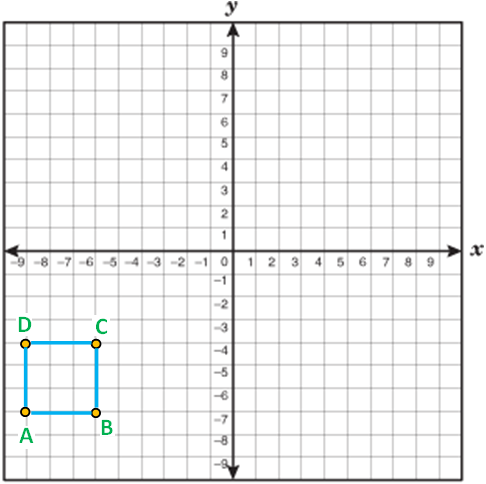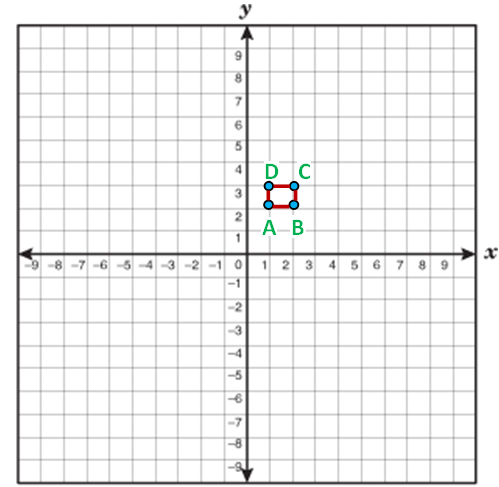CHECK GIVEN FOUR POINTS FORM SQUARE
Subscribe to our ▶️ YouTube channel 🔴 for the latest videos, updates, and tips.
(i) Plot the given points in the graph and draw the square.
(ii) Now we need to find the length of all sides.
(iii) In a square length of all sides are equal.
(iv) Length of diagonals are also equal
If we prove the above two conditions(iii, iv) are true, we can decide that the given points form a square.
Question 1 :
Examine whether the given points
A (-9, -7), B (-6, -7), C (-6, -4) and D (-9, -4)
form a square.
Solution :
Step 1 :

Step 2 :
Finding the length of all sides.
Distance Between Two Points (x1, y1) and (x2, y2)
√(x2 - x1)2 + (y2 - y1)2
Length of side AB :
Here x1 = -9, y1 = -7, x2 = -6 and y2 = -7
= √(-6-(-9))² + (-7-(-7))²
= √(-6+9)² + (-7+7)²
= √3² + 0²
= √9
= 3 units ---(1)
Length of side BC :
Here x1 = -6, y1 = -7, x2 = -6 and y2 = -4
= √(-6-(-6))² + (-4-(-7))²
= √(-6+6)² + (-4+7)²
= √0² + 3²
= √9
= 3 units ---(2)
Length of side CD :
Here x1 = -6, y1 = -4, x2 = -9 and y2 = -4
= √(-9-(-6))² + (-4-(-4))²
= √(-9+6)² + (-4+4)²
= √(-3)² + 0²
= √9
= 3 units ---(3)
Length of side DA :
Here x1 = -9, y1 = -4, x2 = -9 and y2 = -7
= √(-9-(-9))² + (-7-(-4))²
= √(-9+9)² + (-7+4)²
= √0² + 3²
= √9
= 3 units ---(4)
(1) = (2) = (3) = (4)
Length of all sides are equal.
Step 3 :
Length of diagonal AC :
Here x1 = -9, y1 = -7, x2 = -6 and y2 = -4
= √(-6-(-9))2 + (-4-(-7))2
= √(-6+9)² + (-4+7)²
= √3² + 3²
= √9 + 9
= √18 units
Length of diagonal BD :
Here x1 = -6, y1 = -7, x2 = -9 and y2 = -4
= √(-9-(-6))2 + (-4-(-7))2
= √(-9+6)2 + (-4+7)2
= √(-3)2 + 32
= √9 + 9
= √18 units
Length of diagonal AC = Length of diagonal BD
So, the given points are vertices of square.
Question 2 :
Examine whether the given points
A (1, 2), B (2, 2), C (2, 3) and D (1, 3)
forms a square.
Solution :
Step 1 :

Step 2 :
Let the given points are A (1, 2) and B (2, 2) and C (2, 3) and D (1, 3).
Length of side AB :
Here x1 = 1, y1 = 2, x2 = 2 and y2 = 2
= √(2-1)² + (2-2)²
= √(1)² + (0)²
= √1 + 0²
= 1 unit ----(1)
Length of side BC :
Here x1 = 2, y1 = 2, x2 = 2 and y2 = 3
= √(2-2)² + (3-2)²
= √(0)² + (1)²
= √0² + 1
= 1 unit ----(2)
Length of side CD :
Here x1 = 2, y1 = 3, x2 = 1 and y2 = 3
= √(1-2)² + (3-3)²
= √(-1)² + (0)²
= √1 + 0²
= 1 unit ----(3)
Length of side CD :
Here x1 = 1, y1 = 3, x2 = 1 and y2 = 2
= √(1-1)² + (2-3)²
= √(0)² + (-1)²
= √0 + 1
= 1 unit ----(4)
(1) = (2) = (3) = (4)
Step 3 :
Length of diagonal AC :
Here x1 = 1, y1 = 2, x2 = 2 and y2 = 3
= √(2-1)² + (3-2)²
= √(1)² + 1²
= √1 + 1
= √2 units
Length of diagonal BD :
Here x1 = 2, y1 = 2, x2 = 1 and y2 = 3
= √(1-2)2 + (3-2)2
= √(-1)2 + (1)
= √1 + 1
= √2 units
Length of diagonal AC = Length of diagonal BD
So, the given points are vertices of square.
Subscribe to our ▶️ YouTube channel 🔴 for the latest videos, updates, and tips.
Kindly mail your feedback to v4formath@gmail.com
We always appreciate your feedback.
About Us | Contact Us | Privacy Policy
©All rights reserved. onlinemath4all.com

Recent Articles
-
AP Precalculus Problems and Solutions
Feb 05, 26 06:41 AM
AP Precalculus Problems and Solutions -
SAT Math Preparation with Hard Questions
Feb 05, 26 05:30 AM
SAT Math Preparation with Hard Questions -
10 Tricky SAT Math Questions with Answers
Feb 04, 26 07:08 PM
10 Tricky SAT Math Questions with Answers
